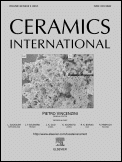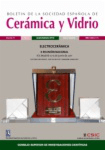
Ceramics International
metrics 2024
Pioneering insights in ceramics and composites.
Introduction
Ceramics International is a premier journal published by ELSEVIER SCI LTD, focusing on advancing the field of materials science with a specific emphasis on ceramics and composites. With an impressive impact factor and a top-tier standing in several critical categories, including Q1 rankings in Ceramics and Composites, Electronic, Optical and Magnetic Materials, and Materials Chemistry, this journal serves as a crucial resource for researchers and professionals alike. Established in 1981, it has consistently showcased cutting-edge research in various domains, including surfaces, coatings, and process chemistry technologies, making it invaluable for those advancing theoretical and practical knowledge in these areas. While access is through subscription, the journal’s rich content, profound insights, and rigorous peer-review process ensure high-quality articles that contribute meaningfully to the scientific community. By fostering innovation and collaboration through rigorous research, Ceramics International stands out as an authoritative source for those dedicated to the evolution of materials science.
Metrics 2024
 0.94
0.94 5.10
5.10 4.70
4.70 155
155Metrics History
Rank 2024
Scopus
IF (Web Of Science)
JCI (Web Of Science)
Quartile History
Similar Journals

Journal of Ceramic Science and Technology
Connecting Theory with Practice in CeramicsJournal of Ceramic Science and Technology, published by GOLLER VERLAG GMBH in Germany, serves as a vital platform for advancements in the field of ceramics and composites. Since its inception in 2010, the journal has contributed significantly to the scholarly literature, encompassing a wide range of topics including the development of new ceramic materials, nanocomposites, and their various applications in industries such as electronics, energy, and medicine. Although currently categorized in the Q4 quartile of ceramics and composites and ranked within the lower percentile in Scopus, the journal strives to bridge the gap between fundamental research and practical implementation, fostering innovative solutions to contemporary materials challenges. With an open-access format, it ensures that valuable findings are disseminated widely, promoting collaboration and knowledge sharing among researchers, professionals, and students in the field. As it converges towards 2024, the Journal of Ceramic Science and Technology remains committed to enhancing the understanding and utilization of ceramic materials, making it an indispensable resource for those dedicated to advancing this dynamic area of study.

REFRACTORIES AND INDUSTRIAL CERAMICS
Fostering Excellence in Refractory and Ceramic InnovationsREFRACTORIES AND INDUSTRIAL CERAMICS is a prestigious journal published by Springer, dedicated to the field of ceramics and composite materials. With an ISSN of 1083-4877 and an E-ISSN of 1573-9139, this journal plays a pivotal role in fostering advances in the development, formulation, and application of refractories and industrial ceramics. The journal has been actively publishing since 1996 and is recognized for its contribution to the academic discourse in the ceramics community. Although it currently holds a Q4 ranking in both Ceramics and Composites and Materials Chemistry categories, it serves as an important platform for emerging research trends and innovations, making it essential reading for researchers, professionals, and students engaged in material science. While access is not open, the journal ensures that high-quality research reaches its audience, reflects the evolving landscape of the ceramics industry, and encourages interdisciplinary collaboration.

Journal of Advanced Dielectrics
Transforming Knowledge into Practical ApplicationsThe Journal of Advanced Dielectrics, published by World Scientific Publishing Co Pte Ltd, is a pivotal open-access platform since 2014 dedicated to advancing research in the fields of dielectrics, ceramics, and composites. Based in Singapore, this journal aims to bridge the gap between theoretical developments and practical applications in Electrical and Electronic Engineering, Condensed Matter Physics, and Electronic, Optical, and Magnetic Materials. With an impressive classification in the 2023 Quartile Rankings indicating its significance within its categories, and notable Scopus Rankings that highlight its impact and relevance, this journal serves as a vital resource for scholars and professionals committed to cutting-edge research and innovation. As it continues to flourish through the converging years from 2015 to 2024, the Journal of Advanced Dielectrics stands as an essential conduit for the dissemination of knowledge in advanced material sciences, making it an indispensable asset for today's research community.

JOURNAL OF SOL-GEL SCIENCE AND TECHNOLOGY
Fostering Collaboration in Cutting-Edge ResearchJOURNAL OF SOL-GEL SCIENCE AND TECHNOLOGY, published by Springer, is a vital resource within the interdisciplinary fields of materials science and engineering, focusing on innovative research related to sol-gel processes and applications. With a rich publication history spanning from 1993, this journal enables the dissemination of cutting-edge findings in biomaterials, ceramics, and composites, ranking impressively across various categories—Q3 in Biomaterials and Q2 in several other materials-related fields. The journal's commitment to quality research is reflected in its Scopus rankings, particularly notable in the categories of Condensed Matter Physics and Materials Chemistry. Researchers and professionals leveraging the insights from this journal are supported through its comprehensive scope, which bridges theoretical foundations with practical applications, advancing knowledge and fostering collaboration among academics and industry leaders alike. As a non-open access journal, it is essential for subscribers and institutions to engage deeply with the latest advancements documented within its pages, underscoring the journal's role in shaping the future of sol-gel science and technology.

Journal of the Korean Ceramic Society
Leading the way in ceramic materials research and discovery.The Journal of the Korean Ceramic Society is a premier academic journal dedicated to advancing the field of ceramics and composites, serving as a vital platform for researchers, professionals, and students alike. Published by SPRINGER HEIDELBERG, this journal boasts an impressive scopus rank of #49 out of 127 in the Materials Science category, with a commendable 61st percentile ranking, highlighting its impact and relevance in contemporary research. Since its inception, the journal has been converging significant research contributions from 2007 to 2024, consistently fostering innovation in ceramic materials and their diverse applications. Although it operates under a traditional access model, the journal remains committed to disseminating high-quality research in ceramics and composites, currently positioned in the Q2 category for 2023. With a strategic focus on the latest developments, methodologies, and interdisciplinary approaches, the Journal of the Korean Ceramic Society is essential reading for anyone engaged in materials science and engineering, aiming to navigate the complexities of this dynamic field.

MATERIALS SCIENCE-POLAND
Innovating Tomorrow's Solutions, TodayMATERIALS SCIENCE-POLAND, published by SCIENDO, is an esteemed open access journal dedicated to the rapidly evolving field of materials science. Since its inception in 2002 and transitioning to an open access model in 2015, the journal has been a vital platform for researchers and professionals to disseminate their findings and contribute to the scientific community. With an ISSN of 2083-134X and an E-ISSN of 2083-134X, it spans a comprehensive range of disciplines, focusing on condensed matter physics, materials science, and mechanical engineering among others. In the 2023 rankings, it holds a position in the Q4 and Q3 quartiles across various categories, showcasing its relevance and ongoing contribution to these fields. Researchers benefit from its accessibility, enabling wider reach and engagement with contemporary topics in material innovation and applications. As the journal continues to evolve until 2024, it remains a cornerstone for scholars looking to advance their knowledge and research in materials science.

Advanced Powder Materials
Elevating Standards in Powder Material ResearchAdvanced Powder Materials, published by KEAI PUBLISHING LTD, stands at the forefront of research in materials science, particularly focusing on the intricate relationships within powder materials and their applications across several domains including catalysis, ceramics, energy, and coatings. With an Open Access policy initiated in 2022, this journal ensures that cutting-edge findings are readily accessible to researchers, professionals, and students globally. Based in Beijing, China, the journal has gained recognition for its exceptional impact, achieving a prestigious Q1 ranking in multiple categories such as Catalysis, Ceramics and Composites, and Materials Science. The journal not only promotes innovative research but also serves as a vital platform for interdisciplinary collaboration, significantly impacting the fields it covers, which also include notable rankings in Metals and Alloys and Surfaces, Coatings, and Films. By fostering an environment of knowledge sharing, Advanced Powder Materials is poised to make substantial contributions to the scientific community over its converged years from 2022 to 2024.

Journal of the Australian Ceramic Society
Innovating Materials Chemistry for TomorrowThe Journal of the Australian Ceramic Society, with ISSN 2510-1560 and E-ISSN 2510-1579, is a distinguished publication by SPRINGER, dedicated to advancing the field of ceramics and composites. Located in Switzerland, this journal serves as a vital platform for researchers, professionals, and students in the realm of materials science, particularly focusing on the innovative applications and developments within ceramics and materials chemistry. Achieving a Q3 quartile ranking in both the Ceramics and Composites and Materials Chemistry categories in 2023, it reflects its commitment to fostering knowledge exchange and intellectual discourse in these critical areas, as evidenced by its Scopus rankings. Spanning from 2007 to 2024, the journal not only supports rigorous peer-reviewed research but also encourages accessibility to cutting-edge findings, making it an essential resource for anyone engaged in ceramic materials research.

BOLETIN DE LA SOCIEDAD ESPANOLA DE CERAMICA Y VIDRIO
Pioneering Discoveries in Ceramic and Composite TechnologiesBOLETIN DE LA SOCIEDAD ESPANOLA DE CERAMICA Y VIDRIO, published by Elsevier, is a premier open-access journal dedicated to advancing research in the fields of Ceramics and Composites, Industrial and Manufacturing Engineering, and Mechanics of Materials. With an impressive impact factor and a strong ranking within its categories—Q2 in 2023 for multiple engineering domains—it serves as a vital resource for academics, industry professionals, and students alike. The journal has embraced an open-access model since 2015, providing widespread accessibility to the latest findings and innovations in ceramic and glass sciences, thus encouraging collaboration and knowledge sharing within the global research community. Published quarterly, and with a focus on interdisciplinary applications, the BOLETIN DE LA SOCIEDAD ESPANOLA DE CERAMICA Y VIDRIO is not only influential in shaping research agendas but also essential for anyone engaged in the evolving landscape of materials science.

JOURNAL OF ELECTROCERAMICS
Pioneering Research in Electroceramics and BeyondJOURNAL OF ELECTROCERAMICS, published by SPRINGER in the Netherlands, serves as a pivotal platform for advancing the field of electroceramics since its inception in 1997. With a keen focus on innovative materials and applications, this journal covers diverse areas encompassing ceramics and composites, condensed matter physics, and electronic materials, significantly contributing to interdisciplinary research. Although currently not an Open Access publication, the journal's engagement in rigorous peer review ensures the dissemination of high-quality research, supported by its respectable Q3 ranking in several relevant categories in 2023. Researchers and professionals will find value in its comprehensive scope, showcasing cutting-edge developments that shape the future of engineering and materials science. The JOURNAL OF ELECTROCERAMICS continues to play a crucial role in bridging theoretical discoveries with practical applications, making it an indispensable resource for students, scholars, and industry experts alike.